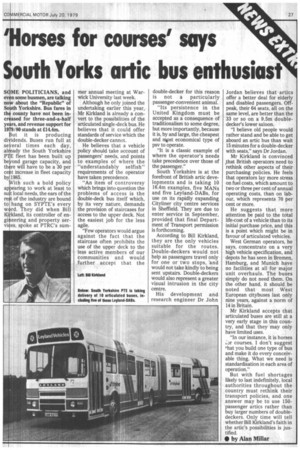orses for courses' says outh Yorks odic bus enthusiast
Page 29

If you've noticed an error in this article please click here to report it so we can fix it.
S ME POLITICIANS, and ev n some busmen, are talking no about the "Republic" of So th Yorkshire. Bus fares in th county have not been incr ased for three-and-a-half y s, and revenue support for 19 9/80 stands at E14.4m.
ut it is producing di idends. Buses run full at se eral times each day, al ady the South Yorkshire P E fleet has been built up be and garage capacity, and th re will have to be a 30 per ce t increase in fleet capacity by 1985.
ith such a bold policy ap aring to work at least to su t local needs, the ears of the re t of the industry are bound to hang on SYPTE's every w rd. They did when Bill kland, its controller of en gi and property servi es, spoke at PTRC's sum mer annual meeting at Warwick University last week.
Although he only joined the undertaking earlier this year Mr Kirkland is already a convert to the possibilities of the articulated single-deck bus. He believes that it could offer standards of service which the double-decker cannot He believes that a vehicle policy should take account of passengers' needs, and points to examples of where the "understandably selfish" requirements of the operator have taken precedence.
"An item of controversy which brings into question the problems of access is the double-deck bus itself which, by its very nature, demands the provision of staircases for access to the upper deck. Not the easiest job for the less agile.
"Few operators would argue against the fact that the staircase often prohibits the use of the upper deck to the less active members of our communities and would further accept that the double-decker for this reason is not a particularly passenger-convenient animal.
"Its persistence in the United Kingdom must be accepted as a consequence of traditionalism to some degree, but more importantly, because it is, by and large, the cheapest and Rost economical type of psv to operate.
"It is a classic example of where the operator's needs take precedence over those of the passenger."
South Yorkshire is at the forefront of British artic developments and is taking 10 16.4m examples, five MANs and five Leyland-DABs, for use on its rapidly expanding Cityliner city centre services in Sheffield. They are due to enter service in September, provided that final Department of Transport permission is forthcoming.
According to Bill Kirkland, they are the only vehicles suitable for the routes. Double-deckers would not help as passengers travel only for one or two stops, 'and would not take kindly to being sent upstairs. Double-deckers would also represent a greater visual intrusion in the city centre.
His development and research engineer Dr John Jordan believes that artics offer a better deal for elderly and disabled passengers. Offpeak, their 64 seats, all on the same level, are better than the 33 or so on a 9.5m doubledecker's lower saloon.
"I believe old people would rather stand and be able to get aboard an artic bus than wait 15 minutes for a double-decker with seats," says Dr Jordan.
Mr Kirkland is convinced that British operators need to rethink other aspects of their purchasing policies. He feels that operators lay more stress on fuel costs, which amount to two or three per cent of annual operating costs, than on labour, which represents 70 per cent or more.
He suggests that more attention be paid to the total life-cost of a vehicle than to its initial purchase price, and this is a point which might be in favour of articulated vehicles.
West German operators, he says, concentrate on a very high vehicle specification, and depots he has seen in Bremen, Hamburg, and Munich have no facilities at all for major unit overhauls. The buses simply do not need them. On the other hand, it should be noted that most West European citybuses last only nine years, against a norm of 14 in Britain.
Mr Kirkland accepts that articulated buses are still at a very early stage in this country, and that they may only have limited uses.
"In our instance, it is horses ;Jr courses. I don't suggest that you build one type of bus and make it do every conceivable thing. What we need is standardisation in each area of operation."
But with fuel shortages likely to last indefinitely, local authorities throughout the country must rethink their transport policies, and one answer may be to use 150passenger artics rather than buy larger numbers of doubledeckers. Only time will tell whether Bill Kirkland's faith in the artic's possibilities is justified.
• by Alan Millar




















































































































